Co-Op Offers 14% Interest -- Too Good to Be True?
"Mr. Second Passport" -- a USA Expat, entrepreneur and YouTuber named Domenick Buonamici -- is out with cautionary advice to Expats seeking to qualify for an Ecuador investment visa.
He was ready to invest in a co-operative (not named by him publicly) that was offering a 14 percent annual return, insured by COSEDE, the Ecuadorian counterpart to the Federal Deposit Insurance Corporation.
Doing due diligence, Dom discovered the co-op is a level-three institution whose incoming deposits are insured only up to $5,000. And that's 5K per investor, not per investment product.
Furthermore, he found out that some co-ops are insured by COSEDE only up to $1,000.
Dom's advice and an exploration of the COSEDE website and how to use it .. are laid out on his YouTube site.
Search at YouTube.com... lied to about bank deposit insurance ecuador
Can you earn nine percent interest on your money? Mr. Second Passport told how it has been doable.
So now we know that seeking 14 percent annual interest in Ecuador is a risky proposition beyond a relatively small investment.
Is nine percent doable? That would dwarf the fraction of one percent that U.S. banks offer to pay in interest.
Mr. Second Passport has said there is a way to nine percent annually at an institution that is insured up to $32,000.
7.7 to 7.9 percent has also been doable.
Details at:
Search at YouTube.com... earning nine percent ecuador insured
Note... this video was produced and webcast in August 2020.
How do they do it?
You may wonder how nine-percent-insured is possible in Ecuador when USA banks offer so little.
Dom explains that the banks here collect higher fees on money they lend than what they pay to investors. For instance, what they collect on car loans and home mortgages (often not available to Expats).
Dom elaborates in the 'nine percent' video referenced above.
cccmedia in Quito
Dom: this is the safest and best for a fixed interest rate.
This 'safest and best' is the cooperativa the Ecuadorian police use. It even has 'Policía' right in the co-op's name.
When Dom posted this video in May of this year (2021), the annual rate this institution offered on insured investments was 9.25 percent based on a 365-day investment.
Search at YouTube.com...
best paying and safest cooperative ecuador
How to invest larger amounts.
If you like Dom's cooperativa strategy and (eventually) want to move more than 32K out of your stock portfolio for an insured income of potentially 9-10 percent (good value for retirees), the obvious strategy is as follows.
Let's say you have 96,000 USD to invest.
Break the investment nest egg into three parts and put the insurable maximum of 32K into each of the top co-ops*. According to Dom's investigating, these are probably the co-op JEP, which he says is the favorite of Expats .. the Policía co-op .. and a third co-op TBD.
This way all your Ecuador-invested money is insured by COSEDE.
*Late-September 2021 update... Further research indicates that the amount that can be invested in each bank type -- for instance, regular banks and co-ops -- may be insurable by COSEDE only up to 32K per type. So an Expat with 96K to invest with insurance could put 32K into a co-op at 9-10 percent, 32K into a major bank and the remaining cash into a TBD investment. The scenario of putting all 96K into insured co-op accounts may not be valid. Further research may be indicated to verify the insurance limits per depositor; I have not run this by my attorney yet.
---
Notes...
The law on how much money can be moved out of Ecuador with/without financial penalty may have changed in recent years. I have not fully researched this. Initial research indicates that the penalty has been reduced from 10 to 5 percent .. and may be reduced further by 2023.
This poster does not have a financial relationship with Mr. Second Passport or any of the banks and financial institutions mentioned on this thread.
cccmedia in Quito
Visit to Cooperativa Policía Nacional.
I decided to move ahead with investing a substantial sum with this cooperativa and today visited the CPN building on Diez de Agosto y Mariana de Jesús (Mariana de Jesús trole stop).
They signed me up, took $20 in deposits and issued me a debit card.
However, the CPN officer told me they could not accept my personal check -- which will be from a USA-based bank account -- and I would have to deposit it at Pichincha Bank. Pichincha is the largest bank in Ecuador.
I told the agent I already had an Ecuadorian savings account with another well-known bank .. and he said to check with my bank to see if could deposit the investment money there.
And so I will.
---
My attorney says many of his clients have invested with coops. He is more or less supervising my steps as I go through the coop investment process.
cccmedia in Quito
Co-op hours and website.
The offices at the CPN headquarters building in Quito are open 8 a.m. to 6 p.m. on weekdays with reduced hours on weekends, according to my CPN agent.
Offices elsewhere in the capital and other cities can be located via the co-op website, www.cpn.fin.ec ...
I do not receive compensation for discussing Cooperativa Policía Nacional or any other financial institution in Ecuador or elsewhere.
cccmedia in Quito
Making the deposit.
I asked some questions about this CD opportunity in an exchange with Cooperativa
Policía Nacional (PCN) financial advisor Daniel Campos.
He told me that the bank(s) that may receive my deposit are not limited to Banco Pichincha, the one bank that the agent at headquarters had steered me towards.
My attorney confirms in a separate email exchange that Pichincha is not unique in this respect.
Apparently, I can deposit the USA check into my Banco Guayaquil savings account .. and then it will be transferred to my new account with CPN.
A CPN agent told me on Thursday that it typically takes eight business days for a USA bank's transfer to become available cash (for the CD purchase) in the CPN account.
cccmedia in Quito
More clarity from CPN.
The CPN co-op financial advisor, Daniel Campos, also told me ...
-- The annual interest rate on an insured deposit, i.e. up to $32,000, is currently an even nine percent. To get to 9.5 percent, it would be necessary to invest 100K or more, only 32K of which would be COSEDE-insured.
-- COSEDE's maximum amount for insurance coverage is $32,000 per investor.
-- The maximum 'plazo' or term on a CD at CPN is one year.
cccmedia
Rolling over your CD.
Daniel told me the bank calls a depositor before the one-year CD term is up .. and invites him or her to roll over the investment for the subsequent 12 months.
---
One advantage of such an investment is that it can qualify the depositor for an investment visa. It's important for an Expat who is thus qualified .. to make sure that the rollover is effected annually so as not to jeopardize the ongoing validity of the visa.
cccmedia in Quito
DorothyPeck wrote:Is that $32,000 for each investor per institution? Or $32,000 at all institutions combined?
Surprisingly, the answer may be .. neither.
You may be able to get COSEDE insurance (paid by the banking institutions) covering $32,000 for an account at one bank, one co-op and one 'mutualista'.
If making multiple investments, you should confirm such limits with the institution/s where you are -- or would be -- depositing, as I wouldn't rely on Internet sourcing alone.
You should also confirm that the institution is rated level one (meaning 32K level of insurance), which confirmation can be found at the COSEDE site. A lower-level rating may mean insurance is limited to 5K or even 1K per depositor.
First-time CD investors in Ecuador should probably be working with an attorney. From my initial research, it appears that the CD must be registered with the national government. Although I have my attorney on the case, I do not have information about attorney fees in this realm.
This is obviously not the simplest type of banking investment you can make, but if you can get 9 percent interest instead of .0000009 percent, it appears to be worth it.
cccmedia in Quito
DorothyPeck wrote:Is that $32,000 for each investor per institution? Or $32,000 at all institutions combined?
It is per institution. However, the 32,000 only applies generally to banks and mutualistas. Cooperativas are variously insured from 1 to 32 thousand. You can check a specific cooperativa at https://www.cosede.gob.ec/conoce-tu-mon … obertura/. There's actually a "course" on COSEDE at https://educate.cosede.gob.ec/ if you want to learn more about the organization/how it functions/etc.
cccmedia wrote:. . .
I decided to move ahead with investing a substantial sum with this cooperativa and today visited the CPN building on Diez de Agosto y Mariana de Jesús (Mariana de Jesús trole stop).
They signed me up, took $20 in deposits and issued me a debit card.
. . .
I'm curious, are you naturalized? I just tried to open an account with CPN and was informed that extranjeros were not allowed to open an account. Also confirmed on the frequent questions portion of their website:
"Preguntas Frecuentes
. . .
6 ¿Como puedo ser Socio de la Cooperativa Policía Nacional?
Para ser Socio debes tener tu cédula de ciudadanía, ser mayor de edad y realizar el proceso de apertura de cuenta de ahorros digital completando la información requerida y aceptando los términos y condiciones,además deberás realizar un aporte único inicial de $20 dólares."
antialiased wrote:I'm curious, are you naturalized? I just tried to open an account with CPN and was informed that extranjeros were not allowed to open an account. Also confirmed on the frequent questions portion of their website:
"Preguntas Frecuentes
. . .
6 ¿Como puedo ser Socio de la Cooperativa Policía Nacional?
Para ser Socio debes tener tu cédula de ciudadanía, ser mayor de edad y realizar el proceso de apertura de cuenta de ahorros digital completando la información requerida y aceptando los términos y condiciones,además deberás realizar un aporte único inicial de $20 dólares."
It's a general requirement for anyone opening a savings account at a financial institution in Ecuador:
You need a cédula, which in my case was issued six years ago when I obtained my investment visa.
The Spanish-language citation you posted says that to be a Socio or partner of CPN, you need a cédula, be of age (an adult), successfully open a savings account per terms and conditions, plus make a $20 deposit.
As for 'extranjeros' not being allowed to open an account, that is incorrect or else a misunderstanding. An extranjero with a cédula, $20 and the willingness to sign the paperwork -- yours truly -- was able to open an account in September.
---
Your post does not make clear if you have a cédula .. or if you plan to be a resident of Ecuador. Please clarify if you post again.
---
A large deposit is being transferred from my USA bank, which takes several weeks .. and then I plan to 'open' the CD at CPN.
cccmedia in Quito
cccmedia wrote:. . .
It's a general requirement for anyone opening a savings account at a financial institution in Ecuador:
You need a cédula, which in my case was issued six years ago when I obtained my investment visa.
The Spanish-language citation you posted says that to be a Socio or partner of CPN, you need a cédula, be of age (an adult), successfully open a savings account per terms and conditions, plus make a $20 deposit.
As for 'extranjeros' not being allowed to open an account, that is incorrect or else a misunderstanding. An extranjero with a cédula, $20 and the willingness to sign the paperwork -- yours truly -- was able to open an account in September.
---
Your post does not make clear if you have a cédula .. or if you plan to be a resident of Ecuador. Please clarify if you post again.
. . .
I've had a couple coop/bank accounts since I moved here in 2017 and am used to the requirement of a "cedula de identidad" (ID card/documant), have my permanent residency and plan to naturalize next year. However, this is the first I've seen a requirement for a "cedula de ciudadanía" (literally citizenship card/document). Plus the exact message I received was that extranjeros could not open an account. Perhaps they didn't know that, made an exception, or have a different policy in Quito. Just sharing my experience.
The ID I have is called the cédula extranjera .. which is possibly different from the CI or cédula de identidad that Ecuadorian citizens have. However, IMO this difference in cédula shouldn't make a difference for applicants to open a CD at CPN in Quito.
cccmedia in Quito
Update: Finally have a CPN CD (certificado de depósito a plazo fijo). Was more difficult because my CI was not in their system so it took some finagling to get my info entered into their database presumably because I am not a citizen (citizens' info is already there). So, even though they say only citizens can open accounts, extranjeros can do so, though may need to go through some extra steps and may take a little longer.
Also, the year-long CD interest amount is currently 9% (at least if you are around or under the insured amount of $32K), so no longer 9.5% (unless perhaps you invest over the insured amount or for some crazy long time).
The proceeds of a USA-bank personal check that I deposited at my bank, Banco Guayaquil, in early October for potential further credit to my CPN Co-op account .. did not move out of my USA bank. I queried the bank, only to be informed that it never saw the deposit.
In order to get an interest yield while these months of CPN-related delay may drag on, I have repurposed part of the USA-bank holdings .. and purchased high-yield (8-12 percent) covered-call ETF's through my main brokerage account.
Unlike the slow-as-molasses process that theoretically will net me Ecuador co-op yields at some point .. it took less than 24 hours to transfer some of my USA-banked funds into my brokerage account and then buy these ETF's such as XYLD, JEPI (not to be confused with JEP) and QYLD.
QYLD's annual yield is 12 percent. Income is received monthly.
Some of these ETF's provide downside protection by utilizing the purchase of puts and/or devoting a portion of their portfolios to low-volatility products. Investors can further limit losses in a down market by the advance placement of stop-loss markers.
cccmedia
CCC,
I like those ETFs. I bought XYLD last month. I have had QYLD in my portfolio for about 3 years reinvesting the distributions monthly. Boring yet lucrative!
I find the risk/reward on these acceptable. Qyld held up well during the March 2020 crash.
@cccmedia I am looking into the Policia National Coop but when I wen't to the Cosede website and put in the information it mentioned at the bottom of the page that the financial entity maintains differences pending payment as of the last reconciled period. I am somewhat concerned about this warning because it basically means the accounting is off so it could just be clearing off some items that were paid a little early or late or possibly a small human error or it can mean financial corruption to the core on the other extreme most likely the former as a friend of mine mentioned he has been getting paid on his CD regularly now since he opened it up but not sure how this will effect the future payments or if this is a common occurence with many bank's and Coop's here. I understand you invested with Policia National wandering if you could comment on your experiences and have you been getting paid as promised on a regular basis?
CD investment for two years.
I finally completed the paperwork and now
have an Ecuador CD as of yesterday.
I invested in a CD at my bank, Banco Guayaquil,
a change from my original plan to obtain
the CD at Cooperativa Policia Nacional, CPN,
where I opened an account.
Two reasons for the change are...
a. Transferring money from my USA bank
through the banking system to CPN was
tediously slow and only partially successful.
b. Banco Guayaquil surprised me with an
8 percent interest-income rate. Historically,
Ecuadorian banks have not offered such a
high rate. The annual rate applies during
each of the two years of the CD's duration.
I have no problem leaving the money
essentially tied up for that period.
---
One reason for the transfer delays was,
as I learned along the way, I was only
able to do one 5K transfer at a time.
Four institutions were involved in the one
transfer that went all the way through --
my main USA bank, a middle-man
SWIFT system bank, Banco Guayaquil
and CPN.
cccmedia in Quito
Advantage of having an 8 percent CD at a bank.
The advantage is that I can potentially invest in
a CPN or co-op CD down the road .. and have
both CD's (one at Banco, one at the co-op)
insured to the maximum by COSEDE. Ideally,
the CD rate at the co-op would be about
9 percent.
This scenario is possible for an individual investor
because the CD's would be in different
financial sectors.
The current maximum-insured
CD amount is 32K per investor
at a bank .. and 32K at a top-segment
co-op such as CPN or JEP.
cccmedia
Just to make it clear for anyone who may be confused: You don't need a bank and a co-op account in order to have two insured CDs in Ecuador. You can have multiple insured CDs as long as each is with a different institution - all of which could be banks or could be co-ops. As I wrote above..."[The insured amount] is per institution. However, the 32,000 only applies generally to banks and mutualistas. Cooperativas are variously insured from 1 to 32 thousand. You can check a specific cooperativa at https://www.cosede.gob.ec/conoce-tu-mon … . There's actually a "course" on COSEDE at https://educate.cosede.gob.ec/ if you want to learn more about the organization/how it functions/etc.
JEP offers 8 percent on CD's to USA citizens
with no Ecuador visa required.
JEP Co-op is offering 8 percent annual
interest to U.S. citizens who invest in
a JEP certificate of deposit. No visa or
cédula is required -- a passport will do.
A one-year CD commitment is required.
Source... an interview with a JEP
representative on Expat Don Shader's
YouTube channel. The video is titled
"Where can I open a bank account
and buy CD's in Ecuador?" The video
was recorded and posted this weekend
(mid-November 2022).
Make your relocation easier with the Ecuador expat guide
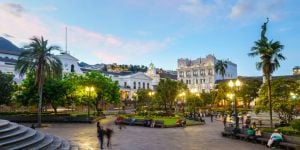
Work in Ecuador
Ecuador is famous as a retirement haven. But you might not want to wait until retirement age to move there and ...

Healthcare in Ecuador
Ecuador, as a fast-developing nation, has laws that are constantly evolving, but one thing is certain: the ongoing ...

Food in Ecuador
What kind of food will you find in restaurants, cafes, and private homes in Ecuador? Many restaurants in Ecuador ...

Leisure activities in Ecuador
You have made it to Ecuador, now what is there to do in your free time? A lifetime in Ecuador isn't enough time to ...
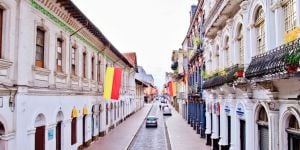
Work in Cuenca
There is no doubt that the Spanish colonial city of Cuenca is a wonderful place to call home, as demonstrated by ...
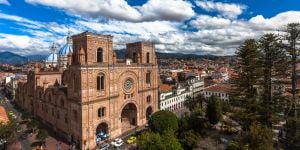
Accommodation in Cuenca
The rose-colored lenses through which potential expats have been made to view Cuenca often blur how the real ...
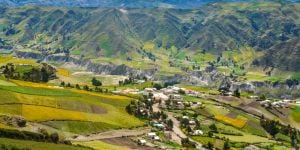
Family and children in Ecuador
Family is everything to an Ecuadorian. The extended family unit is the most important aspect of life in Ecuador, ...
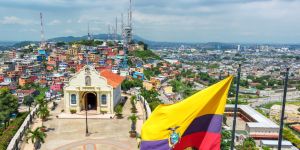
Setting up a business in Ecuador
Forum topics on banking in Ecuador






